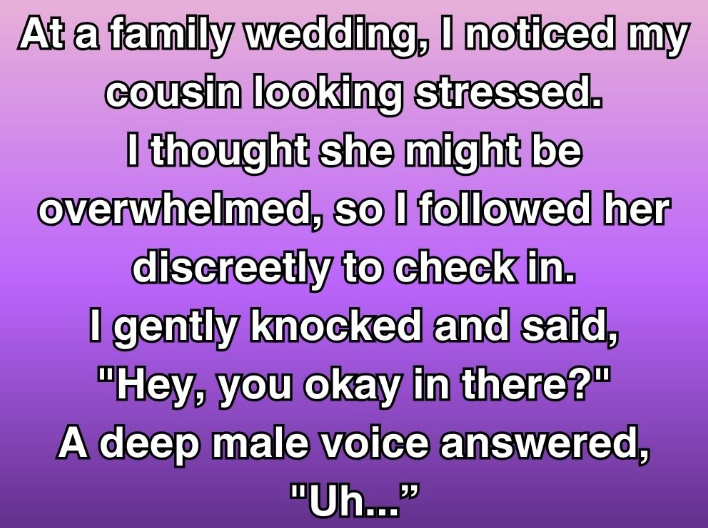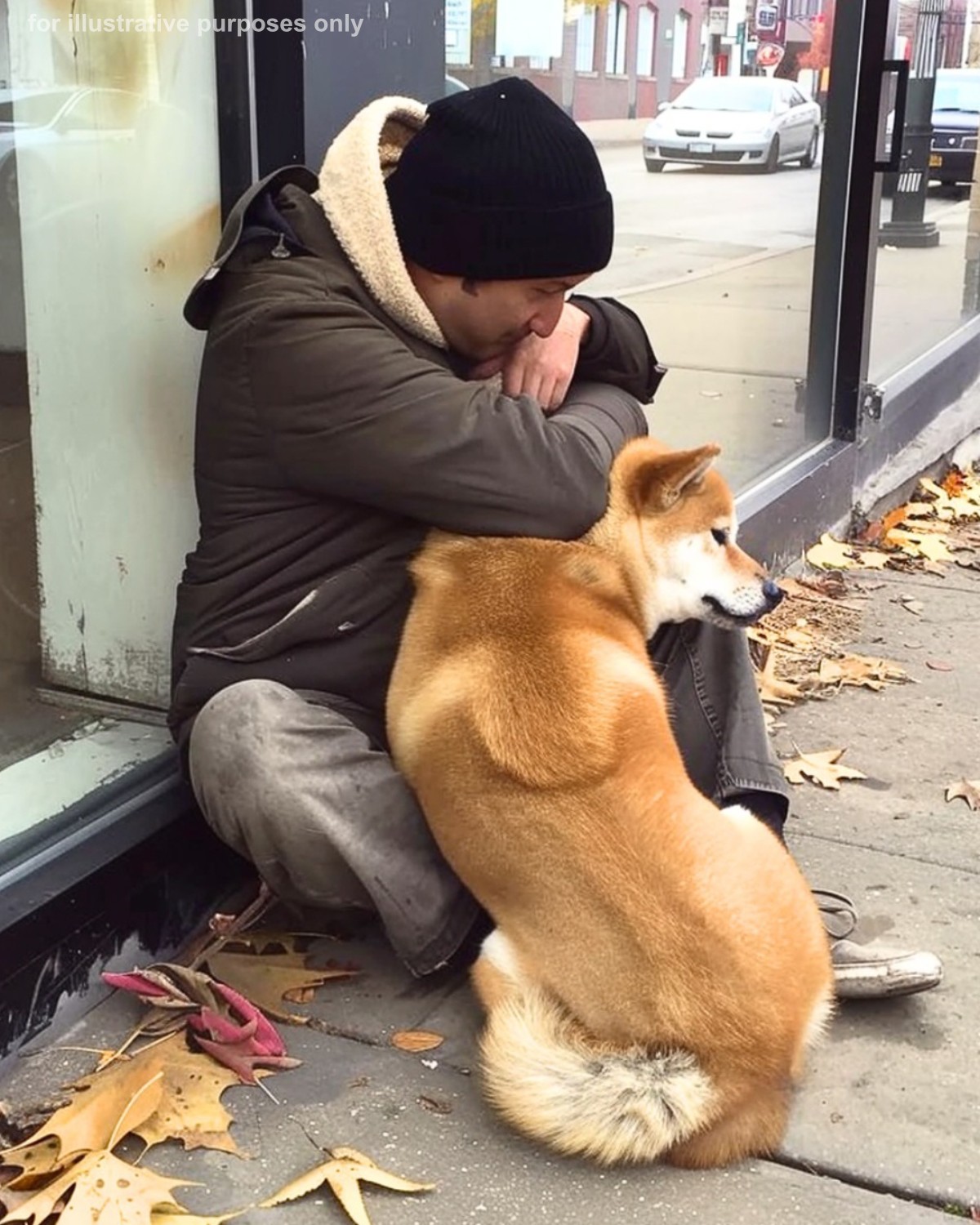At a lively family wedding, I caught sight of my cousin Leena, her face etched with tension.
Concerned she might be feeling swamped, I quietly trailed her to offer support.
I tapped lightly on the door and called out, “Hey, Leena, everything alright?”
A low, unfamiliar male voice replied, “Uh…”
I stood still, heart racing. The bathroom door was closed, but I was certain Leena had entered moments before. No one else had gone in after her.
“Who’s there?” I asked, rapping on the door with more insistence.
The same voice responded, “One moment, please.”
I didn’t want to make a fuss, especially not at a wedding. Leena and I were inseparable growing up, like sisters with intertwined lives. Her smudged mascara and strained smile told me something was deeply wrong.
So, I stayed put.
After an eternity, the door swung open. Leena emerged, her face drained of color, eyes glossy. Behind her stood a man—mid-thirties, bearded, suit slightly disheveled, a stranger to me.
“Who’s he?” I whispered, keeping my voice low.
Her eyes pleaded for me to drop it. “Someone from my past,” she murmured, then hurried back to the ballroom.
The man avoided my gaze and slipped away down the corridor.
I could’ve let it slide. Maybe I should’ve. But Leena’s shaken expression gnawed at me. Why would she hide during her brother’s wedding?
Something wasn’t right.
At the reception, I tried approaching her again. She flitted from hugging relatives to touching up her makeup, laughing brightly with cousins. But I wasn’t deterred. I caught her by the dessert table and said, “Leena, please. What’s happening?”
Her smile faltered. “Tomorrow,” she whispered. “We’ll talk then.”
So, I waited.
The next day, I arrived at her apartment with two iced coffees and the fluffiest muffins I could find. Before I could knock, she opened the door.
“I knew you’d come,” she said softly.
We sat cross-legged on her rug, like we did as kids. Then, she opened up.
The man in the bathroom was Vihaan, her college boyfriend from five years ago. Their breakup wasn’t loud or dramatic—it was the kind that leaves scars, making you wary of love.
“He made me feel worthless,” she said, clutching her coffee. “Like I was fortunate he even noticed me. When I got into grad school and he didn’t, he turned bitter, saying I acted superior.”
My brow furrowed. That wasn’t a breakup—it was toxic.
“One night, drunk, he told me no one would ever truly love me,” she continued. “Said I was too driven, too outspoken. I left him that night and cut all contact.”
My stomach churned.
So why was he at the wedding?
“I don’t know,” she admitted. “That’s what terrified me. He approached me during cocktail hour, grinning like we were pals, saying, ‘Small world, huh?’ He saw my name in the program and decided to show up. Who gatecrashes a wedding?”
A chill ran through me.
“I ducked into the bathroom to escape, but he followed,” she said. “Not threateningly, but with this arrogance, like he still belonged in my space.”
That’s when I knocked.
She looked ashamed, as if she blamed herself.
“He had no right,” I said. “I’m so sorry.”
She nodded, brushing away a tear.
It could’ve ended there, but two days later, I received a DM from an anonymous account. No profile picture, only a message:
“She’s not as innocent as she seems. You don’t know everything.”
My phone nearly slipped from my hand.
Was this Vihaan?
I showed Leena. Her face paled.
“He’s trying to intimidate you now,” she said. “I didn’t think he’d go this far.”
I wasn’t letting this go. I told her to share everything—photos, texts, anything. I’d handled toxic exes before. I knew their playbook.
The more I learned, the clearer it became: Vihaan had a pattern. He’d charm, isolate, erode confidence, then paint his partner as the problem. Leena had evidence—screenshots, DMs, even a voice memo where he called her “damaged goods.”
So, I dug deeper.
Like any protective cousin turned sleuth, I found his LinkedIn. He worked at a tech firm in Irvine, recently promoted. I also uncovered a second Instagram account, private, under a slightly altered name.
It linked to two women I didn’t know.
I reached out cautiously. One responded: Zahra.
Her first message? “Oh no. You too?”
Vihaan’s history unraveled. He targeted driven women, built them up, then turned critical, controlling, jealous.
Zahra shared that he’d once “accidentally” installed a tracking app on her phone. When she tried to leave, he emailed her friends, falsely claiming she’d cheated.
She wasn’t shocked he crashed a wedding.
“That’s him,” she said. “Hiding in plain sight.”
It hit me: this wasn’t only about Leena.
I told her everything. She was rattled but relieved, as if hearing Zahra’s story validated her own.
We made a plan—calm, not vengeful.
Leena sent Vihaan one message:
“Leave me alone. I know your pattern. Contact me again, and I’ll take legal action.”
Then, she blocked him everywhere.
But the real twist came a month later.
Zahra sent me a DM with a screenshot of a Facebook post. Vihaan’s company had quietly fired him. The reason? HR received “multiple reports of inappropriate behavior.”
No names were mentioned.
But I suspected someone had spoken out. Or someone had been watching.
Leena didn’t want revenge—she wanted peace. Sometimes, life delivers justice when you stop seeking it.
Now, Leena’s thriving. She volunteers with a nonprofit, mentoring young girls from underserved communities, teaching them to stand up for themselves, recognize warning signs, and trust their instincts.
“I wish I’d had that guidance,” she said. “Now I can give it.”
The truth is, not everyone who enters your life belongs there. Some are lessons disguised as charm. Others are mirrors you never wanted.
But you can walk away.
You can heal.
And if you’re fortunate, someone will be there, knocking gently, asking, “Hey… you okay?”
Because no one heals alone.
If this story resonates or reminds you of someone, share it. It might be the words they need today. 💬⬇️




